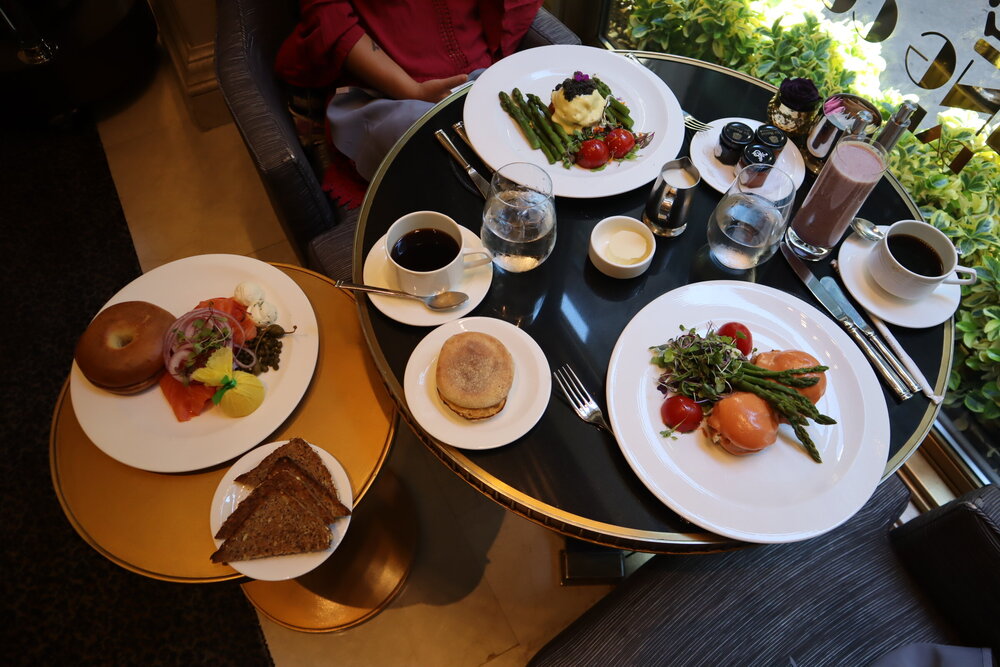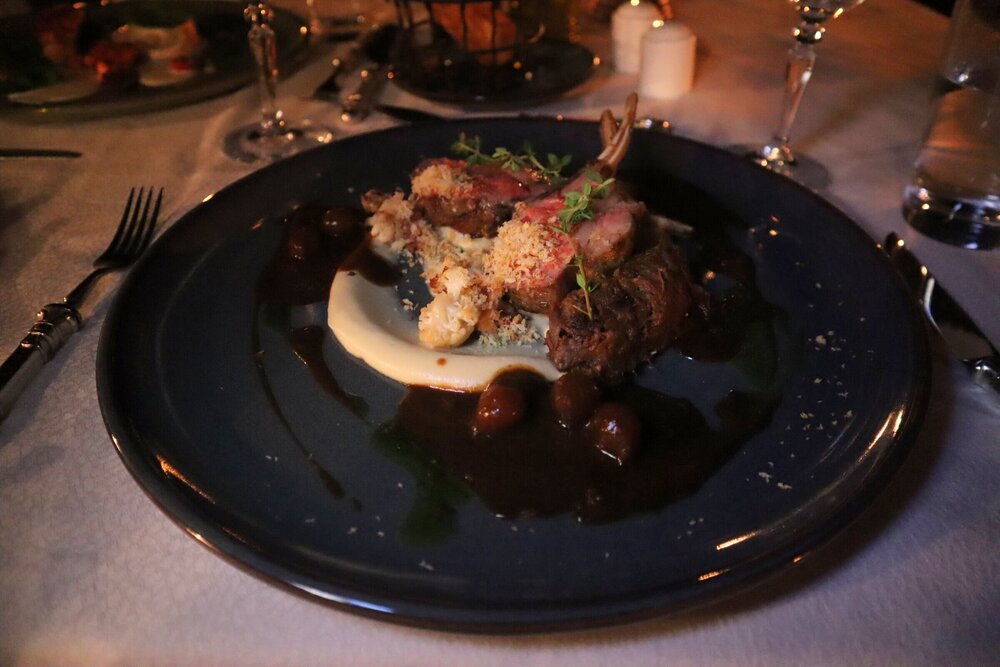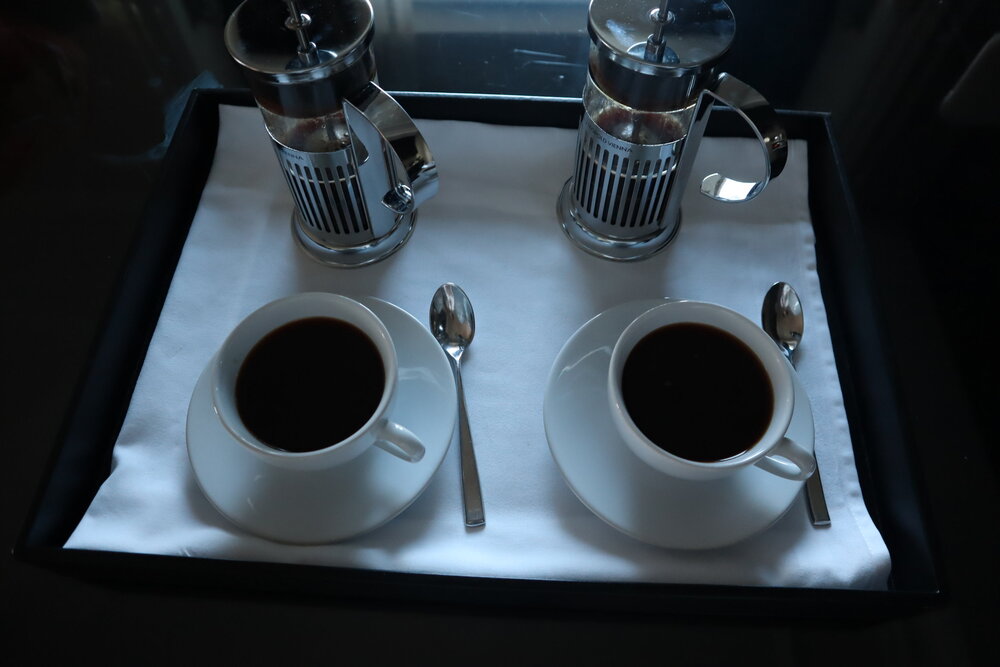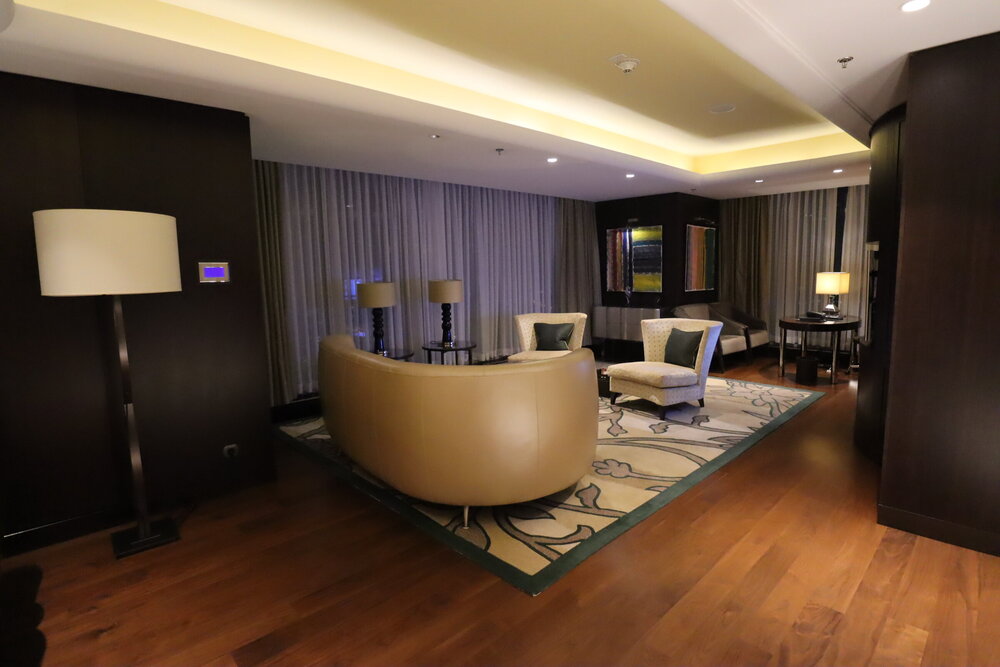I’ve been asked this question a few times in the comment sections of my hotel reviews, so I thought it’d be worthwhile to bring it up for discussion in its own post: How should one handle tipping when staying at high-end hotels, or otherwise indulging in other types of high-end travel experiences?
Is there a greater expectation of tipping among staff members at more upscale establishments? Should you always be prepared with some change for tipping? And if so, how much should you tip to the various staff members who provide you with service?
Obviously everyone will be entitled to their own answers, and I have a feeling that there’s a very broad spectrum of opinions and practices among travellers out there. I’ll share with you my approach, as well as how I arrived at it, and then I do invite you to share your perspective as well.

Breakfast at the St. Regis New York
My Thoughts on Tipping, In General
Before talking about my specific approach to tipping at high-end hotels, I think it’s useful to share my thoughts on “tipping culture” in general. And I have to admit, as someone who never grew up with the mass tipping frenzy that we have in North America, I often find myself feeling very conflicted and confused by the whole idea.
I fully support the idea of a gratuity as a signal of one’s appreciation for service that’s outstanding in some way or another – “outstanding” being the operative word.
I disagree, on principle alone, with what seems like a pervasive cultural expectation of tipping regardless of the quality of the service.
Having said that, soon after moving to Canada, I came to understand that we’re all living within a system that, for better or worse, fails to provide service industry workers with a living wage. This system results in many such individuals relying on tips to get by, and eventually, what was originally a discretionary gratuity morphed into an onus on the patron. This is something I’ve more or less come to accept, even though I wasn’t accustomed to it at first.
(It’s not just in North America, either. In late 2015, restaurants in London, where I had always viewed gratuities as more of an appreciative gesture than an expectations, moved to automatically add a 12.5% “discretionary service charge” to all bills, and you’d have to be a real curmudgeon to pipe up and insist that the charge be removed.)
Nowadays, while I still retain some element of the Eastern perspective that the price of services ought to be as advertised, and that tipping feels somewhat out of the ordinary, I’d like to think I’m a decent patron in my daily life in Canada, customarily adding a 15% tip when dining out, taking taxis, or visiting the hairdresser (although not quite when using Uber, who only recently added an option to tip your driver – I’m still getting used to that!)

Dinner at Al Maha Desert Resort Dubai
My Approach to Tipping at High-End Hotels
With the above in mind, I would describe my tipping behaviour at high-end hotels as casual and at times rather arbitrary.
I like to offer a tip to show my appreciation for excellent service, and I’ll also sometimes leave tips when the occasion for a tip happens to arise, and I have the means to do so (i.e., I happen to have some spare change in the local currency in my wallet). But when neither of those criteria are met, I can’t say I actively go out of my way for the purpose of tipping.

Coffee via Butler Service at the St. Regis Toronto
There are a few reasons for this rather imprecise approach, and I’d say the main one goes back to the idea of tipping as a show of appreciation vs. tipping as a cultural expectation.
While the latter mindset seems to prevail in Western countries, and most notably in North America, it’s my understanding that the rest of the world continues to view gratuities as entirely optional on the part of the customer, but fully appreciated when it is in fact given.
On the other hand, in some countries, tipping is such a foreign concept that receiving one can be a source of confusion and even embarrassment for the individual who provided the service. Japan is perhaps the most notable examples of this, and one of the first pieces of advice that Western tourists often receive when visiting Japan is that tipping is absolutely not necessary and can perhaps even be offensive.
When I land in a new country, I’m therefore never quite certain about the local pulse in terms of tipping, so I usually default to the assumption that it’s “unnecessary but appreciated”.

Hand-delivered room service breakfast at Mystique Santorini
What adds further complexity is the question of how much in gratuities a certain individual providing a certain service deserves.
Do housekeeping workers deserve a higher tip than the bellhop helping us with our luggage, who perform a relatively less laborious task but is dressed up much more smartly? Do bellhops working at a Ritz-Carlton deserve a higher tip than those working at a Sheraton?
I don’t think there are any one-size-fits-all answers, and I don’t exactly feel comfortable shouldering the responsibility of making these judgments in the first place.
Finally, there’s the question of whether one should tip more generously in places with lower income levels, where your gratuity dollars would make a comparatively greater difference to the recipient.
Indeed, there’s kind of a backwards situation here, where the world’s most pervasive cultural expectations of tipping are found in North America, a place whose individuals would, relatively speaking, benefit from tipping the least – a $20 tip for a tour guide in Cambodia, for example, goes a lot further than a $20 for a waiter back home.
A Few Examples
Taking all that into account, I’ve therefore decided to keep things simple, and I’ll happily leave a tip if I feel compelled to do so by excellent service or if it’s convenient for me to do so, but I won’t overthink it too much otherwise.
As a few examples that come to mind over the past few months from my high-end hotel stays:
-
We left a US$50 bill for our server at Al Maha Desert Resort at the end of our three-night stay for his stellar service throughout the many multi-course meals we took at the restaurant
-
I recently gave the equivalent of a US$5 tip to the bellhop at The Ritz-Carlton, Almaty, who helped me with my bags, simply because I was in great spirits after being upgraded to a Club Suite
-
We left a generous tip for our server at breakfast at the St. Regis New York by adding it to the room tab; this was a situation where I felt somewhat compelled by the tipping culture in North America, and especially New York, to leave a tip on the full dollar amount of breakfast, even though the breakfast was paid for by credits from our elite status
-
We gave a US$5 tip to the driver of the House Bentley at the St. Regis New York, even though the drop-off was only a few blocks away; this felt like something that the usual clientele of the St. Regis’s house car would do, and we also happened to have the change on us at the time

Club Suite at The Ritz-Carlton, Almaty
That last point brings me to a few situations when it seemed like a tip might have been expected, or at least that other customers might’ve been inclined to leave a tip in the past, but that I either didn’t have spare change on me, or wasn’t given the opportunity to add the tip the room bill.
Examples of these might include asking for butler service at St. Regis hotels, enjoying a complimentary hotel breakfast as an elite member but not having to sign a bill of any kind, any of the innumerable times that we’ve been helped by a bellhop but didn’t have cash on us… or perhaps the entirety of my recent one-night stop in Cancún, Mexico, when it seemed like every person I encountered from the airport to the hotel was waiting a split moment extra for a possible tip, but I simply didn’t have any cash on me.
Usually, in these situations, I simply express my gratitude for their service, and they’re quite understanding about it.
Does Tipping Bring You Even Better Service?
The above basically describes my thoughts on the matter and my behaviour as a result, although I must mention that my girlfriend Jessy places a much greater emphasis on tipping when we’re travelling than I do.
Her perspective is that for many individuals working at hotels – especially those frequently patronized by North American travellers – tips are not only something that they appreciate, but rather they help them towards earning a living wage and are therefore a means of survival.
Since we have the means to leave a tip without breaking the bank (and let’s be honest, the immense privilege of booking a great number of our hotel stays at a fraction of the price thanks to Miles & Points), we should do our utmost to show our appreciation for the people who help us make our stay comfortable – not only for exceptional service, but to show our appreciation across the board in general.

Complimentary drop-off in the House Bentley at the St. Regis New York
Jessy also maintains that we’d receive much better service at hotels if we were to tip better and especially if we were to be more deliberate about tipping – for example, by ensuring we have enough spare change on us beforehand to tip the people we come across.
My relative parsimony on this matter has been a source of disagreement between us in the past, although I am intrigued by Jessy’s point on tipping as a signal to invite better service, and we may well decide to tip a little more generously on our upcoming travels and put that theory to the test.
Conclusion
Whether to tip, and how much to tip, are both decisions that are personal to every individual, and the point of this article is certainly not to encourage anyone to change their behaviour in this regard. Instead, I wanted to share my own approach as someone who perhaps never fully understood “tipping culture” in the first place, and open it up for discussion to see if my behaviour might be moulded in any way going forward.
What principles guide your tipping behaviour along your travels? Do you do so out of altruism, convenience, obligation, a means towards better service, or not at all? Do you vary your tipping behaviour based on the poshness of your surroundings, the individual in question, or the local average income? I’d love to hear your thoughts on all of these questions in the comments below.















I hate machines that suggest a tip STARTING at 20% and even 25%. The arrogance of that assumption irritates me so much that I manually enter 10% while I would have happily accepted a 12% or 15% suggestion.
I’ll open with I think tipping is getting ridiculous in Canada. Every shop now has a tip jar and I refuse to acknowledge it. And tipping percentage should be calculated on the bill not on the taxes. I’m lazy enough to let this pass on the machine by selecting 15% on the whole bill but I dont feel really great on it.
My tipping is arbitrary but fairly systematic. Wait staff and hairdressers 15%. Taxis I round up to the next 5 dollar increment if I’m paying cash. 15% if I’m using a machine. I dont tip bell hops (dont usually use them) and I dont tip the cleaning staff whihc is probably unfair….it’s just that I never actually see them.
Tour guides and such like I try to give them something too. depends mostly on what I have handy.
It gets fuzzier for me though once I have a free thing happening. I’ve had a few steaks comped by wait staff and I always try to tip as if it was included in the bill. If I were to get free breakfast I think I would feel compelled to tip. I’ll get back to you if I ever get platinum status.
I agree with you on the 15% on the bill, not the taxes. I’m always skipping the "15%" button and entering the amount manually for this reason. Good way to sharpen your mental math too.
I am a firm believer that tipping should be based on the service and should derive from gratitude and appreciation to the counterpart. Thus I find the “pseudo obligatory” tipping culture in N.A to be challenging.
Outside N.A – I tip when I get a great service and it’s because I really felt happy & I am thereby sharing my happiness & gratitude. (again it depends on if I have spare change with me – but most of the times I make a point I tip or atleast write a handwritten note or pass a good word to the property manager)
In N.A – now I purposely carry 5$ & 10$ Bills. Because almost everytime, the breakfast will be comped due to elite status & for some reason I find tipping on full price to be a rip off especially because it’s mostly a self serve buffet with the maître assisting you with the seating & the coffee / juice. Thus I place a 5/10$ bill (depending on number of pax).
Having said that, in certain occasions where the maître went above and beyond – I happily tipped more.
I rarely tip the bellboy as almost always I carry my own bags.
In general, I rather have the properties pay more wages to their employee even if in result in slight increase in the product cost so that tipping is expected only when the service is above & beyond.
I have been on both the sides of the tipping story. I used to work at a mid-end restaurant, hourly rate was lower than minimum wage, and tip was a big part at the end of day. I would say it comes from both sides: if the server does a good job of taking care for you and go further than their responsibility to assist you, they expect better tip (18-20% +), if the server just does minimum services of taking your order and bringing your food, they expect regular tip (12-15%). If for some reason the server makes you feel uncomfortable (service is bad, food takes too long, etc.), they don’t expect you to tip either. I would say: tip accordingly on the service you receive.
Ricky … In Toronto and New York the hotel staff get their wage plus a 15% gratuity from the hotel that is charged to the customer. Your average full time hotel employee whether it be the cleaning maid or the bartender make a six figure salary. … no joke !! Look carefully at the majority of staff there… the average age is 60 + cause the pay is so GOOD they would rather work till they die than quit as the work is so easy and the pay so good. So while i cant speak about other countries…. in Toronto and NYC dont tip… they already get it from the hotel. Anything extra goes right in their pocket on top of their 6 figure salary
Tj, I do not find your statement at all believeable. There are no chamber maids in Toronto making 6 figure salaries. Those 60+ year olds that are still working are doing so because the pay level is so low (and usually their English so poor) that they have been unable to save for retirement. Particularly in high rent places like Toronto. Where did you get this impression?
One of things in Canada that galls me these days is the tipping function on keypads when picking up take out orders. What have they done to deserve that?
You can simply skip it, it’s more of a default function on the machine, more than a requirement. The server doesn’t expect you to tip anyways. And to answer your question what they have done: they put your food in the box and in the bag properly, with cutlery with sauce if needed. I did have take out food in the past that was a mess when I open the box.
Great post Ricky. Here is an example I’d like clarity on….Platinum breakfast with Marriott: assuming the hotel is in North America, are you expected to tip for the complimentary breakfast when they provide a bill that allows you to room charge the tip (thought they stamp it complementary "for your records")? I feel obligated to tip, but it certainly sours the "complimentary" part of the benefit.
I have no clear answer on this, and in the past I’ve both tipped and not tipped. I don’t necessarily think the hosts/waiters expect a tip in these situations, but they’d appreciate it, so I usually only tip if someone left a particularly good impression in some way, as @Manu alluded to below.